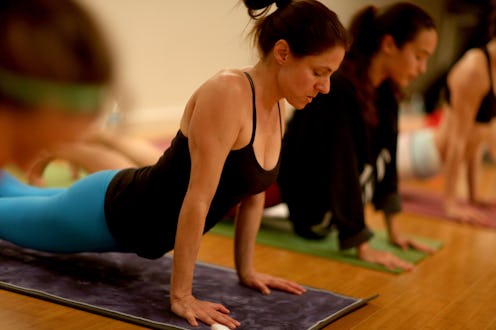Life
7 Popular Exercise Myths You Shouldn't Believe
When it comes to exercising, there seems to be a lot of different information floating around the Web. From advice that says you have to do cardio every day to get fit, to tips on how to tone up with just a few simple moves, it can be difficult to decipher truth from fact when it comes to the "dos and don'ts" of exercising. Add in the fact that everyone's bodies, lifestyles, and schedules are different makes it even harder to know what to listen to and what to ignore. Why are these myths so perpetuated? "I think it's a matter of word of mouth combined with people telling themselves what they want to hear," says fitness expert Obi Obadike. "What adds to that problem is the amount of inaccurate health and fitness content floating all over the Internet."
Though not all popular tips about exercise are untrue (yes, you should try to get in 30 minutes of activity each and every day) it's important to know which to listen to and those to throw in the trash. To help you sift through fact and fiction, we spoke with Obadike and The Biggest Loser physician Dr. Robert Huizenga to find out the most common misconceptions when it comes to fitness and exercising.
1. Weight training makes you bulky
Not lifting weights in fear of looking like the Hulk? Think again.
"This is completely false," says Obadike. "Weight training is an important component of any exercise routine, regardless of gender. Weight training will help you burn more calories throughout the day, and keep your metabolism revved up." Unless you're eating a tremendous amount of calories and lifting ridiculously heavy weights, you don't have to worry about looking like a bodybuilder anytime soon.
2. You should weigh yourself every day to measure progress
"Your weight can vary up or down by as many as 15 pounds based on your level of hydration, ankle swelling, and salt intake," says Dr. Huizenga. "Additionally, scale weights do not reflect whether lower weight results from excess fat loss, or from water, muscle, critical organ proteins or bone loss."
Your weight can also fluctuate based on time of day, your menstrual cycle, and what scale you're using. Instead, focus on how your body feels rather than what the scale says, paying attention to whether you feel stronger or more energetic.
3. You can spot-train to fix one specific area of your body
Sorry, ladies. Unfortunately, there's no one exercise to help you get Jen Selter's butt or give you Jennifer Aniston's arms. To make one part of your body stand out, you still need to work out your whole body first.
"I have clients approach me all the time saying they just want to tighten up one 'trouble area,'" says Obadike. "The best way to do that is a consistent combination of cardio and weight training."
4. You don't need to exercise if you eat well
"This is still a common misconception," says Dr. Huizenga. "Proper two-a-day exercise results in muscle retention or even frank muscle gains." Not only does high-intensity exercise help with maintaining your weight, but it also has benefits that extend beyond your physical appearance. Exercising daily keeps your mind healthy, your brain sharp, and helps prevent disease, including cardiovascular and diabetes.
5. You need at least an hour at the gym in order for that workout to make a difference
Only have 30 minutes between work and happy hour? No reason to skip the gym just because you're short on time.
"If you only have 20 minutes free for exercise, don't cop out and tell yourself a 20-minute workout won't do anything and that you may as well skip it," says Obadike. "Twenty minutes of high-intensity cardio and weight training a day is actually much more effective than working out for a full hour once a week."
6. Spinning makes your quads get big
There's a reason so many people are such die-hard Soul Cycle fans. Spinning works out your whole body, from your abs to your arms to your glutes. "The key to spinning is maintaining proper form," says Obadike. "If you're working the core and your full leg, you shouldn't be putting the amount of pressure on your quads that you'd need in order to bulk up."
7. You have to work out on an empty stomach
Hungry before your workout? Don't be afraid to eat a snack before you begin moving. Contrary to popular belief, you don't need to keep your stomach empty before exercising. Studies show that you burn the same amount of fat on an empty stomach than you do with food in your stomach, and having fuel in your body also helps retain muscle and contribute to levels of exercise intensity.
Images: binkwilder,kizette,75842274@N05,nottinghamtrentuni/Flickr; jenselter/Instagram; Getty Images (2)
